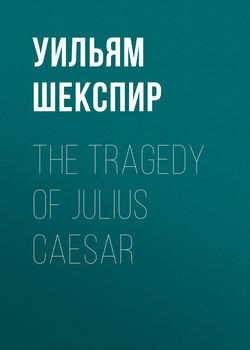Читать книгу The Tragedy of Julius Caesar - Уильям Шекспир, William Szekspir, the Simon Studio - Страница 2
SCENE: Rome, the conspirators' camp near Sardis, and the plains of Philippi
ACT I. SCENE I. Rome. A street
ОглавлениеEnter Flavius, Marullus, and certain Commoners.
FLAVIUS. Hence, home, you idle creatures, get you home.
Is this a holiday? What, know you not,
Being mechanical, you ought not walk
Upon a laboring day without the sign
Of your profession? Speak, what trade art thou?
FIRST COMMONER. Why, sir, a carpenter.
MARULLUS. Where is thy leather apron and thy rule?
What dost thou with thy best apparel on?
You, sir, what trade are you?
SECOND COMMONER. Truly, sir, in respect of a fine workman, I am
but, as you would say, a cobbler.
MARULLUS. But what trade art thou? Answer me directly.
SECOND COMMONER. A trade, sir, that, I hope, I may use with a
safe
conscience, which is indeed, sir, a mender of bad soles.
MARULLUS. What trade, thou knave? Thou naughty knave, what
trade?
SECOND COMMONER. Nay, I beseech you, sir, be not out with me;
yet,
if you be out, sir, I can mend you.
MARULLUS. What mean'st thou by that? Mend me, thou saucy
fellow!
SECOND COMMONER. Why, sir, cobble you.
FLAVIUS. Thou art a cobbler, art thou?
SECOND COMMONER. Truly, Sir, all that I live by is with the
awl; I
meddle with no tradesman's matters, nor women's matters, but
with
awl. I am indeed, sir, a surgeon to old shoes; when they are
in
great danger, I recover them. As proper men as ever trod upon
neat's leather have gone upon my handiwork.
FLAVIUS. But wherefore art not in thy shop today?
Why dost thou lead these men about the streets?
SECOND COMMONER. Truly, sir, to wear out their shoes to get
myself
into more work. But indeed, sir, we make holiday to see
Caesar
and to rejoice in his triumph.
MARULLUS. Wherefore rejoice? What conquest brings he home?
What tributaries follow him to Rome
To grace in captive bonds his chariot wheels?
You blocks, you stones, you worse than senseless things!
O you hard hearts, you cruel men of Rome,
Knew you not Pompey? Many a time and oft
Have you climb'd up to walls and battlements,
To towers and windows, yea, to chimney tops,
Your infants in your arms, and there have sat
The livelong day with patient expectation
To see great Pompey pass the streets of Rome.
And when you saw his chariot but appear,
Have you not made an universal shout
That Tiber trembled underneath her banks
To hear the replication of your sounds
Made in her concave shores?
And do you now put on your best attire?
And do you now cull out a holiday?
And do you now strew flowers in his way
That comes in triumph over Pompey's blood?
Be gone!
Run to your houses, fall upon your knees,
Pray to the gods to intermit the plague
That needs must light on this ingratitude.
FLAVIUS. Go, go, good countrymen, and, for this fault,
Assemble all the poor men of your sort,
Draw them to Tiber banks, and weep your tears
Into the channel, till the lowest stream
Do kiss the most exalted shores of all.
Exeunt all Commoners
See whether their basest metal be not moved;
They vanish tongue-tied in their guiltiness.
Go you down that way towards the Capitol;
This way will I. Disrobe the images
If you do find them deck'd with ceremonies.
MARULLUS. May we do so?
You know it is the feast of Lupercal.
FLAVIUS. It is no matter; let no images
Be hung with Caesar's trophies. I'll about
And drive away the vulgar from the streets;
So do you too, where you perceive them thick.
These growing feathers pluck'd from Caesar's wing
Will make him fly an ordinary pitch,
Who else would soar above the view of men
And keep us all in servile fearfulness. Exeunt.
